The Wolves of Midwinter Read online
Page 6
“That makes perfect sense,” he whispered. Again, he shuddered. He couldn’t help it.
“This is what I would do, if I were you,” she said suddenly, blotting her lips, and swallowing half the iced cola in her glass. “I’d be open, willing, eager to discover what the ghost wants. I mean, if this is the personality of Marchent Nideck, if there is something coherent and real and feeling there, well, be open to it. Now I know this is easy for me to say in a cheerful little crowded café in broad daylight, and of course, I haven’t seen this, but that is what I’d try to do.”
He nodded. “I’m not afraid of her,” he said. “I’m afraid that she’s miserable, that she, Marchent, does exist somewhere and it’s not a good place. I want to comfort her, do what I can to give her whatever she wants.”
“Of course.”
“Do you think it’s conceivable that she’s troubled about the house, about the fact that Felix is back now, yet I own the house? Marchent didn’t know Felix was alive when she gave me the house.”
“I doubt it has anything to do with that,” said Laura. “Felix is rich. If he wanted Nideck Point, he’d offer to buy it from you. He isn’t living there as your guest because he lacks the means.” She went on eating as she spoke, easily cleaning her plate. “Felix owns all the property bordering on Nideck Point. I heard him talking about it to Galton and the other handymen. It’s no secret. He was discussing it casually with them, hiring them to do other work. The Hamilton place to the north has belonged to him for the last five years. And the Drexel place to the east was bought by him long before that. Galton’s men are working on those houses now. Felix owns the land south of Nideck Point, all the way from the coast inland to the town of Nideck. There are old homes throughout these areas, homes like Galton’s home, but Felix stands ready to buy each and every one of them whenever the owners want to sell.”
“Then he did plan to come back,” said Reuben. “He planned to come back all the time. And he does want the house. He has to want it.”
“No, Reuben, you’ve got it wrong,” she said. “Yes, he planned someday to return. But not while Marchent was connected to the property. After she’d moved to South America, his agents made repeated offers under various names to purchase the house, but Marchent always refused. Felix told me this himself, just in conversation. Nothing secretive about it. He was waiting her out. Then events caught him completely unawares.”
“The point is he wants it now,” said Reuben. “Of course he wants it. He built it himself.”
“But he’s not in any hurry,” she said.
“I’ll give it to him. It never cost me one silver dime.”
“But do you think this ghost knows all these things?” Laura asked. “Does this ghost care?”
“No,” he said. He shook his head. He thought of Marchent’s contorted face, thought of her hand extended, as if to reach through the glass. “Maybe I’m on the wrong track. Maybe it’s the Christmas plans that are disturbing her spirit—plans for a party so soon after her death. But maybe that’s not it at all.”
Again, he had a strong sense of Marchent, as if the apparition had involved a new and eerie intimacy, and the misery he’d felt seemed infinitely more deeply rooted in the Marchent he knew.
“No, the party plans wouldn’t offend her. That wouldn’t be enough to bring her back from wherever she is, make her visit you in this way.”
Reuben’s mind drifted. He fell silent. He realized nothing more could be known until this spirit appeared to him again.
“Ghosts often come at Midwinter, don’t they?” Laura asked. “I mean, think of all the Christmas ghost stories in the English language. That’s always been a matter of tradition, that ghosts walk at this time of the year; they’re strong at this time, as though the veil between the living and dead becomes fragile.”
“Yes, Phil always said the same thing,” Reuben said. “That’s why Dickens’s Christmas Carol has such a strong hold on us. It’s all that old lore about spirits coming through at this time of year.”
“Come back to me,” said Laura taking his hand. “Don’t think about this any more now.” She motioned for the check. “There’s a little bed-and-breakfast near here.” She smiled at him, the most incandescent and gently knowing smile. “It’s always fun, isn’t it, a different bed, different rafters overhead.”
“Let’s go,” he said.
Two blocks away in a charming Craftsman cottage nestled in a garden, they made love in an old brass bed below a close sloping ceiling. Yellow flowers in the wallpaper. Candle on the old cast-iron mantel. Rose petals on the sheet.
Laura was rough, urgent, inflaming him with her hunger.
Suddenly she stopped and drew back.
“Can you bring it on now?” she whispered. “Please, do it. Be the Man Wolf for me.”
The room was shadowy, quiet, white shutters closed against the fading afternoon light.
Before he could reply, the metamorphosis had begun.
He found himself standing by the bed, his body yielding up the wolfen coat, the claws, the rippling, elongating tendons of his arms and legs. It was as if he could hear his mane growing, hear the silken hair covering his face. He looked about him with new eyes at the quaint, fragile furnishings of the room.
“And this is what you want, madam?” he asked in the usual low, baritone voice of the Man Wolf, so much darker, richer than his own normal voice. “We are risking discovery, are we, for this?”
She smiled.
She was studying him as never before. She ran her hands over the fur on his forehead, her fingers gripping the long rougher hair of his head.
He drew her towards him and then down on the bare boards. She pushed and pulled as if she wanted to provoke him, beating against his chest with her fists even as she kissed him, pressing her tongue to his fang teeth.
6
IT WAS LATE AFTERNOON when Reuben returned from Sonoma. The rain was thin but steady and the light almost as dim as twilight.
When he caught sight of the house he felt an immediate relief. Workers had finished lining every single window on the façade with tiny bright yellow Christmas lights in perfectly neat lines, and the front door was framed with thick evergreen garland wound with lights as well.
How cheerful and comforting it looked. The workmen were just finishing, and the trucks pulled off the terrace right after he pulled up. Only one truck remained for the crew that was working on the guesthouse on the lower slope, and it would soon be gone as well.
The main rooms were also extremely cheerful, with the usual fires going, and a great undecorated Christmas tree stood to the right of the conservatory doors. More thick and beautiful green garland had been added to the fireplaces and their mantelpieces. And the delicious fragrance of the evergreens everywhere was sweet.
But the house was empty, and that was odd. Reuben had not been alone in this house since the Distinguished Gentlemen had arrived. Notes on the kitchen counter told Reuben that Felix had taken Lisa down the coast for shopping; Heddy was napping; and Jean Pierre had taken Stuart and Margon to the town of Napa for dinner.
Strange as this was, Reuben didn’t mind it. He was deep in his thoughts of Marchent. He’d been thinking of Marchent on the long drive back from Sonoma, and it only now came to him, as he put on a pot of coffee, that his afternoon with Laura had been blissful—the lunch, the bed-and-breakfast lovemaking—because he had not been afraid anymore of the changes in her.
He took a quick shower, putting on his blue blazer and gray wool pants as he often did for dinner, and was on his way down the hall towards the stairs when he heard the low, faint sound of a radio coming from somewhere on the west side of the house, his side of the house.
It took him only a moment in the hallway to locate the origin of the sound. It was Marchent’s old room.
The hallway was grim and shadowy as always, as it had no windows, and only a few scattered wall sconces with parchment shades and small bulbs. And he could see a seam of light under her
door.
There came that eerie throbbing terror again, only slowly. He felt the transformation coming but did all in his power to stop it as he stood there, shaken, and not certain what to do.
A dozen explanations might account for the light and the radio. Felix might have left on both after searching for something in Marchent’s closet or desk.
Reuben was unable to move. He fought the prickling in his face and hands, but he couldn’t entirely stifle it. His hands were now what somebody might call hirsute and a quick examination of his face told him it was the same. So be it. But of what use was this subtle enhancement against the possibility of a ghost?
The radio was playing an old dreamy melodic song from the nineties. He knew that song, knew that slow hypnotic beat and that deep female voice. “Take Me As I Am”—that was it. Mary Fahl with the October Project. He’d danced to that song with his high school girlfriend, Charlotte. It had been an old song by then. This was too palpable, too real.
Suddenly, he was so angry with his own panic that he knocked on the door.
The knob slowly turned and the door opened, and he saw the darkened figure of Marchent looking at him, the lamp behind her only partially illuminating the room.
He stood stock-still staring at the dark figure, and slowly her features became visible, the familiar angles of her face and her large unhappy and imploring eyes.
She wore the same bloodstained negligee and he could see the light glinting on countless tiny pearls.
He tried to speak, but the muscles of his face and jaw were petrified, as were his arms and his legs.
They weren’t two feet apart.
His heart seemed about to explode.
He felt himself backing away from the figure, and then the entire scene went dark. He was standing in the silent empty hallway, trembling, sweating, and the door to Marchent’s room was closed.
In a fury, he opened the door and walked into the darkened room. Groping for the wall button he found it and snapped on a collection of scattered small lamps.
The sweat broke out all over his chest and arms. His fingers were slippery with it. The wolf change had stopped. The wolf hair was gone now. But he still felt the pringling and the tremors in his hands and feet. And he forced himself to take several slow breaths.
No sound of a radio, no sight of a radio even, and all the room as he remembered it from the last time he’d inspected it before Felix and Margon and the others had ever come.
The windows were done in elaborate white-lace-ruffled curtains, and so was the canopy of the heavy brass four-poster bed. An old-fashioned dressing table in the far-north corner had been fitted with a skirt in the same starched white-lace ruffles. The bedspread was pink chintz and the overstuffed love seat by the fire was covered in the same fabric. There was a desk, ultra-feminine like all the rest, with Queen Anne legs, and white bookshelves half filled with a few hardcover books.
The closet door was ajar. Nothing inside but a half-dozen padded clothes hangers. Pretty. Some were covered in toile, others in pastel silk. Perfumed. Just there on the closet bar, empty hangers—a symbol for him suddenly of loss, of the horrid reality of Marchent having vanished into death.
Dust on the shelves above. Dust on the hardwood floor. Nothing to be found, nothing to which a vagrant spirit might have sadly attached itself—if that’s what vagrant spirits did.
“Marchent,” he whispered. He put his hand to his forehead, then took out his handkerchief and wiped the sweat from it. “Marchent, please,” he whispered again. He couldn’t remember from the lore he’d heard all his life whether a ghost could read your mind. “Marchent, help me,” he offered, but his whisper sounded huge in the empty room, and as unnerving to him suddenly as everything else.
The bathroom was empty and immaculate, with empty cabinets. No radio to be seen. Smell of bleach.
How pretty the wallpaper was, an old toile pattern with pastoral figures, in blue and white. This was like the pattern on the padded hangers.
He imagined her bathing in the long oval claw-foot tub, and a wave of her intimate presence caught him off guard, fragments of their moments in each other’s arms on that ghastly night, fragments of her warm face against his, and her soft soothing voice.
He turned and inspected the scene before him, and then slowly he made his way to the bed. It wasn’t a high bed at all, and he sat down on the side of it, facing the windows, and he closed his eyes.
“Marchent, help me,” he said under his breath. “Help me. What is it, Marchent?” If he’d ever known sorrow like this before, he couldn’t remember it. His soul was shaken. And suddenly he began to cry. The whole world seemed empty to him, devoid of any hope, of any possibility of dreams. “I’m so sorry about what happened,” he said thickly. “Marchent, I came as soon as I heard you scream. I swear to God, I did, but they were too much for me, the two of them, and besides, I was just too late.”
He bowed his head. “Tell me what it is you want of me, please,” he said. He was crying just like a child now. He thought of Felix downstairs in the library last night, asking himself why he had never come home during all those years, feeling such awful regret. He thought of Felix in the hallway last night saying so dejectedly, “Why should she want me to have anything … after the way I abandoned her?”
He took out his handkerchief and wiped his nose and mouth.
“I can’t answer for Felix,” he said. “I don’t know why he did what he did. Or if I do, I can’t say. But I can tell you that I love you. I would have given my life to stop them from hurting you. I would have done that without a thought.”
A kind of relief coursed through him, but he felt it was cheap and undeserved. The finality of her death deserved better. The finality of her death left him crushed. Yet he had, in a rush, said so many things that he’d been longing to say and that felt good, though perhaps it didn’t matter to her at all. He had no idea whether or not Marchent really existed in any realm where she might see him or hear him, or what the apparition at the door had been.
“But all this is true, Marchent,” he said. “And you left me the gift of this house, and I did nothing to deserve it, nothing, and I’m alive here, and I don’t know what’s happened to you, to you, Marchent—I don’t understand.”
He didn’t have any more words to speak out loud. In his heart, he said, I loved you so much.
He thought of how unhappy he’d been when he met her. He thought of how desperately he’d wanted to be free not only of his loving family but of his miserable connection with Celeste. Celeste had not loved him. She had not even liked him. And he had not liked her either. That was the truth. It had all been vanity, he thought suddenly, her wanting the “handsome boyfriend” as she called him so often to others in that high mocking tone, and him believing he ought to want such a smart and adorable woman whom his mother liked so much. The truth was Celeste had made him miserable, and as for his family, well, he’d needed to escape them for a while if he was ever to find what it was that he wanted to do.
“And now thanks to you,” he whispered, “I live in this world.”
And remembering suddenly her love for Felix, her grief for him, her weary conviction that he was dead and gone, he knew a pain that he could hardly bear. What right had he to the Felix for whom she’d mourned? The injustice of it, the horror of it, paralyzed him.
For a long moment he sat there shivering, shivering as if he were cold when he wasn’t cold, his eyes closed, wondering at all of it, and very far now from the terror and the shock he’d felt only moments ago. There were worse things in this world than fear.
A sound came from the bed, the sound of the springs and the mattress creaking, and he felt the mattress shifting just to his right.
The blood drained out of his face, and his heart began to skip.
She was sitting next to him! He knew it. He felt her hand suddenly on his hand, supple flesh this, and the pressure of her breasts against his arm.
Slowly he opened his eyes, and looked
into hers.
“Oh God in heaven,” he whispered. He couldn’t stop the words from coming though they were slurred and low. “God in heaven,” he said as he forced himself to look at her, truly look at her, at her pale pink lips and the fine pen-stroke lines of her face. Her blond hair was glistening in the light. The silk of the white negligee, right against his arm, was rising and falling with her breath. He could feel her breath. She drew even closer, her cold hand covering his right hand as it tightened its grip, and her other hand closing on his left shoulder.
He looked right into her soft moist eyes. He made himself do it. But his right hand moved away from hers in a sudden jerking motion that he couldn’t control, and with it he made the Sign of the Cross. It had been like a spasm and he was suddenly red with shame.
A little sigh came from her. Her eyebrows puckered and the sigh became a moan.
“I’m so sorry!” he said. “Tell me.…” He was stammering, clenching his teeth in his panic. “Tell me … what can I do?”
The expression on her face was one of unutterable torment. Slowly she lowered her gaze and looked away, her bobbed hair falling down over her cheek. He wanted to touch her hair, touch her skin, touch all of her. Then her eyes veered back to him, full to the brim with misery, and it seemed she was about to speak; she was struggling desperately to speak.
At once the vision brightened as if it were filling with light and then it dissolved.
It was gone as if it had never been. And he was alone on the bed, alone in her room, alone in the house. The minutes ticked as he sat there, unable to move.
She wasn’t coming back, he knew it. Whatever in God’s name she was now—ghost, spirit, earthbound—she’d taxed herself to the limit of her powers, and she wasn’t coming back. And he was sweating again, his heart thudding in his ears. The palms of his hands and the soles of his feet burned. He could feel the wolf hair under his skin like myriad needles. It was torture to hold it back.
Without resolving to do it, he got up and hurried down the stairs and out the back door.

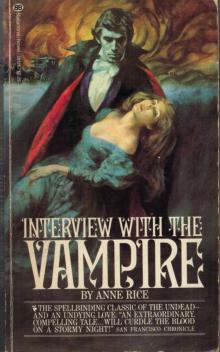 Interview with the Vampire
Interview with the Vampire Christ the Lord: Out of Egypt
Christ the Lord: Out of Egypt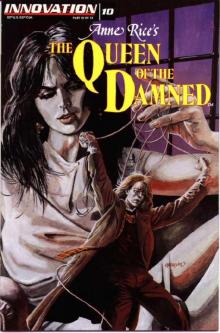 The Queen Of The Damned
The Queen Of The Damned The Claiming of Sleeping Beauty
The Claiming of Sleeping Beauty Prince Lestat
Prince Lestat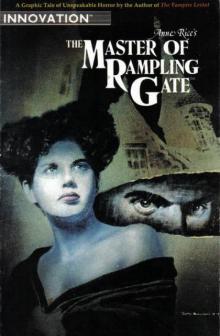 The Master of Rampling Gate
The Master of Rampling Gate The Vampire Lestat
The Vampire Lestat Blood Canticle
Blood Canticle Beauty's Release
Beauty's Release Pandora
Pandora Servant of the Bones
Servant of the Bones Of Love and Evil
Of Love and Evil Beauty's Punishment
Beauty's Punishment Cry to Heaven
Cry to Heaven The Tale of the Body Thief
The Tale of the Body Thief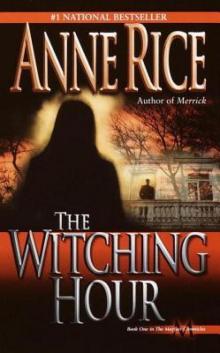 The Witching Hour
The Witching Hour Memnoch the Devil
Memnoch the Devil Blackwood Farm
Blackwood Farm Beauty's Kingdom
Beauty's Kingdom Belinda
Belinda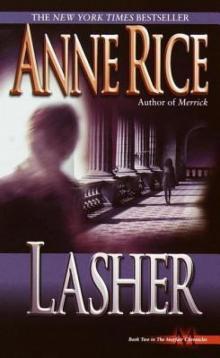 Lasher
Lasher Vittorio, the Vampire
Vittorio, the Vampire Angel Time
Angel Time Called Out of Darkness: A Spiritual Confession
Called Out of Darkness: A Spiritual Confession Blood And Gold
Blood And Gold The Passion of Cleopatra
The Passion of Cleopatra Taltos
Taltos Exit to Eden
Exit to Eden Blood Communion (The Vampire Chronicles #13)
Blood Communion (The Vampire Chronicles #13) The Wolf Gift
The Wolf Gift The Wolves of Midwinter
The Wolves of Midwinter Prince Lestat and the Realms of Atlantis
Prince Lestat and the Realms of Atlantis The Ultimate Undead
The Ultimate Undead The Vampire Lestat tvc-2
The Vampire Lestat tvc-2 The Road to Cana
The Road to Cana Taltos lotmw-3
Taltos lotmw-3 Merrick tvc-7
Merrick tvc-7 Called Out of Darkness
Called Out of Darkness Pandora - New Vampires 01
Pandora - New Vampires 01 Bllod and Gold
Bllod and Gold The Queen Of the Damned: Vampire Chronicles
The Queen Of the Damned: Vampire Chronicles The Sleeping Beauty Trilogy
The Sleeping Beauty Trilogy The Claiming of Sleeping Beauty b-1
The Claiming of Sleeping Beauty b-1 Lasher lotmw-2
Lasher lotmw-2 The Tale of the Body Thief tvc-4
The Tale of the Body Thief tvc-4 The Vampire Chronicles Collection
The Vampire Chronicles Collection Ramses the Damned
Ramses the Damned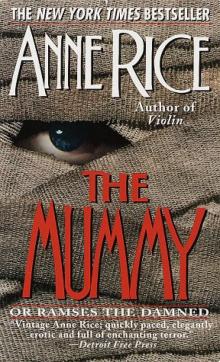 The Mummy - or Ramses the Damned
The Mummy - or Ramses the Damned Vittorio, The Vampire - New Vampires 02
Vittorio, The Vampire - New Vampires 02 The Vampire Armand tvc-6
The Vampire Armand tvc-6 Queen of the Damned tvc-3
Queen of the Damned tvc-3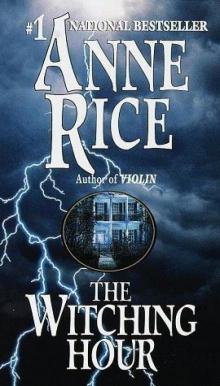 The witching hour lotmw-1
The witching hour lotmw-1 Feast of All Saints
Feast of All Saints Queen of the Damned
Queen of the Damned The Wolves of Midwinter twgc-2
The Wolves of Midwinter twgc-2 The Mummy
The Mummy Blood and Gold tvc-8
Blood and Gold tvc-8 Blood Communion
Blood Communion Interview with the Vampire tvc-1
Interview with the Vampire tvc-1 Prince Lestat: The Vampire Chronicles
Prince Lestat: The Vampire Chronicles